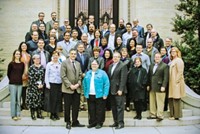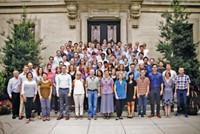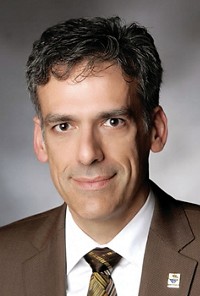Advertisement
Grab your lab coat. Let's get started
Welcome!
Welcome!
Create an account below to get 6 C&EN articles per month, receive newsletters and more - all free.
It seems this is your first time logging in online. Please enter the following information to continue.
As an ACS member you automatically get access to this site. All we need is few more details to create your reading experience.
Not you? Sign in with a different account.
Not you? Sign in with a different account.
ERROR 1
ERROR 1
ERROR 2
ERROR 2
ERROR 2
ERROR 2
ERROR 2
Password and Confirm password must match.
If you have an ACS member number, please enter it here so we can link this account to your membership. (optional)
ERROR 2
ACS values your privacy. By submitting your information, you are gaining access to C&EN and subscribing to our weekly newsletter. We use the information you provide to make your reading experience better, and we will never sell your data to third party members.
Careers
Mentoring New Faculty—It Really Works!
What you didn’t learn in graduate school about being a professor
by Rigoberto Hernandez, District IV Director
March 24, 2014
| A version of this story appeared in
Volume 92, Issue 12
The first day on the job for starting assistant professors can be daunting. Because of their extensive scientific training, there’s no doubt that new professors will be able to do the research necessary to advance scientific knowledge. The trouble is that they received little training or practice in the many other roles now expected of them: teaching a course with 200 undergraduates, leading a group of graduate students and postdocs (some of whom are older than they are), writing grant proposals to a myriad of agencies each with its own specialized rules, and the list goes on. Meanwhile, the cost of failure is too great, for both the new faculty and their college or university, to leave their success to chance. They need as much information and training as possible, and this is why providing them with good mentoring is so important.
It may seem odd to discuss the plight of assistant professors who have just beaten out hundreds of other applicants to start a career at a primarily graduate institution. These new faculty are clearly very talented and are finally entering a stage of complete independence. Doesn’t seem so bad, and yet, as noted above, many barriers to success remain. Correspondingly, chemistry departments are finding that early-career faculty need to be taught effective practices so they can successfully navigate their careers.
In the absence of a user manual, mentoring from colleagues—ranging from peers to the most senior faculty—is absolutely critical. Indeed, at my institution, Georgia Institute of Technology, junior chemistry faculty are now paired with a few mentors within our department as well as a mentor from outside the department.
You may readily agree with the notion that mentoring has a positive impact. In fact, that intuition is backed up by recent data. For example, Martina Stamm and Barbara Buddeberg-Fischer of University Hospital Zurich found that mentoring had a positive effect on the career success of a cohort of Swiss doctors (Med. Educ. 2011, DOI: 10.1111/j.1365-2923.2010.03857.x). It’s instructive to note that women in that cohort received less mentoring and consequently experienced diminished career success.
The take-home message is that we need to mentor all early-career faculty to increase their success broadly and equitably.
Toward this end, the Cottrell Scholars Collaborative (CSC) New Faculty Workshop is providing starting assistant professors in primarily graduate institutions with the tools needed to fly into their academic careers.
The initial New Faculty Workshops mimicked, in part, the highly successful workshop for new physics and astronomy faculty held biannually by the American Association of Physics Teachers. There’s little doubt that the physics community has been heavily impacted by those workshops, an outcome that has made it painfully clear how such a workshop is truly needed in the academic chemistry community.
The New Faculty Workshop program is sponsored by the Research Corporation for Science Advancement (RCSA) and the American Chemical Society. The workshops have been held annually in Washington, D.C., since 2012 (C&EN, Sept. 3, 2012, page 76). Andrew L. Feig and Rory Waterman, RCSA Cottrell Scholars, initiated and continue to lead the effort along with other members of CSC. I acted as a facilitator last summer and wrote about my experience on my EveryWhereChemistry blog (see bit.ly/1hrQxIL and bit.ly/1fRw8it).
The 2014 CSC New Faculty Workshop will be held July 31 to Aug. 2. It will include sessions on (1) balancing teaching and research; (2) using active pedagogies and engagement of students to make teaching more effective, more enjoyable, and less time-consuming; (3) facilitating large-format classes; (4) mentoring graduate students and undergraduates; (5) managing a laboratory; and (6) using best practices for grant writing, with representatives from the National Institutes of Health, National Science Foundation, Department of Energy, and/or RCSA.
The instructional techniques are modeled in each of the workshop presentations so attendees can learn how to convey content effectively for different class sizes and course structures. The facilitators are tenured faculty who have effectively integrated research and education into their funded portfolios. The response from the young faculty who have participated in past workshops has been overwhelmingly positive.
Where do you come in? First, please spread the word to students, postdocs, and early-career faculty that such a program exists. It sends the message that we, as a community, are creating a culture for their success if they choose to enter academia. Second, support efforts to sustain the workshops as a yearly effort moving forward.
The reach of these mentoring efforts should also go beyond primarily graduate institutions in the near future, if all goes according to plan. Ideally, there will be new faculty workshops led by faculty from parallel institutions—comprehensive universities, primarily undergraduate institutions, and two-year colleges—so that suggested effective practices can be given the appropriate context. This will all take funding and buy-in from additional sponsoring agencies and academic administrations. It will also require additional volunteers as organizers and facilitators.
Finally, encourage your junior colleagues to attend a workshop. But don’t stop mentoring them with only that one piece of advice!
Details about the CSC workshop and applications are at chem.wayne.edu/feiggroup/CSCNFW. If you are a starting assistant professor, apply by the May 1 deadline!
Views expressed on this page are those of the author and not necessarily those of ACS.






Join the conversation
Contact the reporter
Submit a Letter to the Editor for publication
Engage with us on Twitter